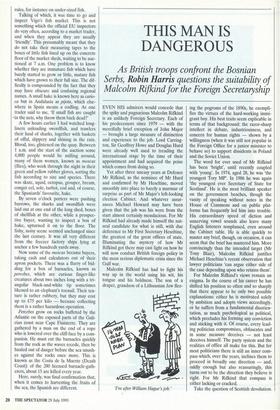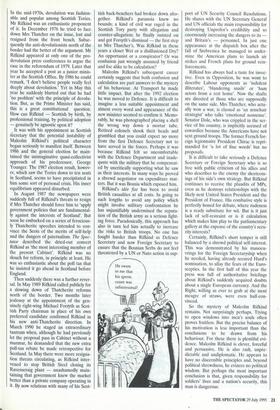THIS MAN IS DANGEROUS
As British troops confront the Bosnian Serbs, Robin Harris questions the suitability of Malcolm Rifkind for the Foreign Secretaryship
EVEN HIS admirers would concede that the spiky and pugnacious Malcolm Rifkind is an unlikely Foreign Secretary. Each of his predecessors since 1979 — with the mercifully brief exception of John Major — brought a large measure of distinction and experience to the job. Lord Carring- ton, Sir Geoffrey Howe and Douglas Hurd were already well used to treading the international stage by the time of their appointment and had acquired the poise which comes from doing so.
Yet after three uneasy years at Defence Mr Rifkind, as the nominee of Mr Hurd and confirmed by Mr Heseltine, moved smoothly into place to barely a murmur of surprise as part of Mr Major's left-looking election Cabinet. And whatever assur- ances Michael Howard may have been given that the job was his were from the start almost certainly mendacious. For Mr Rifkind had already made himself the nat- ural candidate for what is still, with due deference to Mr First Secretary Heseltine, the greatest of the great offices of state. Illuminating the mystery of how Mr Rifkind got there may cast light on how he will now conduct British foreign policy in the most serious diplomatic crisis since the Gulf war.
Malcolm Rifkind has had to fight his way up in the world using his wit, his tongue and his boldness. The son of a draper, grandson of a Lithuanian Jew flee- I'm after William Hague's job.' ing the pogroms of the 1890s, he exempli- fies the virtues of the hard-working immi- grant boy. His best traits seem explicable in terms of that background: the razor-sharp intellect in debate, industriousness, and concern for human rights — shown by a willingness (when it was still not popular in the Foreign Office for a junior minister to behave so) to support dissidents in Poland and the Soviet Union.
The word for ever used of Mr Rifkind has been 'bright', until recently coupled with 'young'. In 1974, aged 28, he was 'the youngest Tory MP'. In 1986 he was again `the youngest ever Secretary of State for Scotland'. He is the most brilliant speaker on the government benches, though the vanity of speaking without notes in the House of Commons and on public plat- forms has frequently led him into trouble. His extraordinary speed of diction and unnerving vowel sounds also leave many English listeners nonplussed, even around the Cabinet table. He is able quickly to master any brief, though, on occasion, it can seem that the brief has mastered him. More convincingly than the intended target (Mr Tony Blair), Malcolm Rifkind justifies Michael Heseltine's recent observation that lawyer politicians 'can argue either side of the case depending upon who retains them'.
For Malcolm Rifkind's views remain an enigma. In the course of his career he has shifted his position so often and so sharply that there appear to be only two possible explanations: either he is motivated solely by ambition and adopts views accordingly, or he suffers from a fundamental disorien- tation, as much psychological as political, which precludes his forming any conviction and sticking with it. Of course, every lead- ing politician compromises, obfuscates and in some measure deceives — not least deceives himself. The party system and the realities of office all make for this. But for most politicians there is still an inner com- pass which, over the years, inclines them to proceed in broadly one direction — and, oddly enough but also reassuringly, this turns out to be the direction they believe is right. For Mr Rifkind that compass is either lacking or cracked.
Take the question of Scottish devolution. In the mid-1970s, devolution was fashion- able and popular among Scottish Tories.
Mr Rifkind was an enthusiastic proponent of it. In December 1976 he tried to face down Mrs Thatcher on the issue, lost and resigned from the front bench. Subse- quently the anti-devolutionists north of the border had the better of the argument. Mr Rifkind appeared at only one of the pro- devolution press conferences to argue the case in the referendum of 1979. Later that year he accepted a post as a junior minis- ter at the Scottish Office. By 1986 he could remark, 'I don't believe people really feel deeply about devolution.' Yet in May this year he suddenly blurted out that he had `no problem' with the principle of devolu- tion. But, as the Prime Minister has said, this is a great constitutional question. How can Rifkind — Scottish by birth, by professional training, by political adoption — genuinely be agnostic upon it?
It was with his appointment as Scottish secretary that the potential instability of Malcolm Rifkind's political character began seriously to manifest itself. Between 1986 and the general election he main- tained the unimaginative quasi-collectivist approach of his predecessor, George Younger. The 1987 election result, howev- er, which saw the Tories down to ten seats in Scotland, seems to have precipitated in him some sort of personal crisis. His inner equilibrium appeared disturbed.
In August 1987 the newspapers were suddenly full of Rifkind's threats to resign if Mrs Thatcher should force him to 'apply government policies that are fundamental- ly against the interests of Scotland'. But soon he embarked on a series of ferocious- ly Thatcherite speeches intended to con- vince the Scots of the merits of self-help and the dangers of paternalism. The Spec- tator described the dried-out convert Rifkind as 'the most interesting member of the present Cabinet'. Rifkind was no slouch for reform, in principle at least. He was so enthusiastic about the poll tax that he insisted it go ahead in Scotland before England.
Then suddenly there was a further rever- sal. In May 1989 Rifkind called publicly for a slowing down of Thatcherite reforms north of the border. Two months later jealousy at the appointment, of the gen- uinely right-wing Michael Forsyth as Scot- tish Party chairman in place of his own preferred candidate confirmed Rifkind in his new anti-Thatcherite direction. In March 1990 he staged an extraordinary tantrum when, although he had previously let the proposal pass in Cabinet without a murmur, he demanded that the new extra poll-tax rebate be made retrospective for Scotland. In May there were more resigna- tion threats circulating, as Rifkind inter- vened to stop British Steel closing its Ravenscraig plant — unashamedly main- taining that government knew the market better than a private company operating in it. By now relations with many of his Scot- tish back-benchers had broken down alto- gether. Rifkind's paranoia knew no bounds; a kind of civil war raged in the Scottish Tory party with allegation and counter-allegation; he finally insisted on and got Forsyth's dismissal — the first step to Mrs Thatcher's. Was Rifkind in these years a closet Wet or a disillusioned Dry? An opportunist or a conspirator? Or was confusion just wrongly assumed by friend and foe alike to be calculation?
Malcolm Rifkind's subsequent career certainly suggests that both confusion and calculation are part answers to the mystery of his behaviour. At Transport he made little impact. But after the 1992 election he was moved to Defence. It is difficult to imagine a less suitable appointment and almost every word and appearance of the new minister seemed to confirm it. Memo- rably, he was photographed placing a shell the wrong way down a mortar tube. Retired colonels shook their heads and grumbled that you could expect no more from the first Defence Secretary not to have served in the forces. Perhaps it was because Rifkind felt so uncomfortable with the Defence Department and inade- quate with the military that he compensat- ed by uncritically supporting what he saw as their interests. In many ways he proved a shrewd negotiator on expenditure mat- ters. But it was Bosnia which exposed him.
Rifkind's iclie fire has been to avoid British casualties at all costs. In going to such lengths to avoid any policy which might involve military confrontation he has unjustifiably undermined the reputa- tion of the British army as a serious fight- ing force. Paradoxically, this approach has also in turn led him actually to increase the risks to British troops. No one has fought harder than Rifkind as Defence Secretary and now Foreign Secretary to ensure that the Bosnian Serbs do not feel threatened by a UN or Nato action in sup- port of UN Security Council Resolutions. He shares with the UN Secretary General and UN officials the main responsibility for destroying Unprofor's credibility and so enormously increasing the dangers to its and Britain's — personnel. In just one appearance at the dispatch box after the fall of Srebrenica he managed to under- mine the American plans to launch air strikes and French plans for ground rein- forcements.
Rifkind has always had a taste for invec- tive. Even in Opposition, he was wont to describe Labour opponents as 'indolent illiterates', 'blundering snails' or 'ham actors from a rest home'. Now the shafts are directed at those who are supposedly on the same side. Mrs Thatcher, who actu- ally won a war, is classed as 'an armchair strategist' who talks 'emotional nonsense'. Senator Dole, who was crippled in the ser- vice of his country, is implicitly accused of cowardice because the Americans have not sent ground troops. The former French for- eign legionnaire President Chirac is repri- manded for 'a lot of fine words' but no proposals.
It is difficult to take seriously a Defence Secretary or Foreign Secretary who is so free with public criticism of his allies and who describes to the enemy the shortcom- ings of his side's own strategy. But Rifkind continues to receive the plaudits of MPs, even as he destroys relationships with the likely next United States President and the President of France. His combative style is perfectly honed for debate, where rudeness is a ready substitute for wit. But is it just lack of self-restraint or is it calculation which makes him play to the parliamentary gallery at the expense of the country's secu- rity interests?
Certainly, Rifkind's short temper is still balanced by a shrewd political self-interest. This was demonstrated by his manoeu- vrings for the Foreign Secretaryship when he needed, having already secured Hurd's nomination, to allay the fears of the Euro- sceptics. In the first half of this year the press was full of authoritative briefings about Rifkind's suddenly acquired doubts about a single European currency. And the Right, willing as ever to grab at the most meagre of straws, were even half-con- vinced.
So the mystery of Malcolm Rifkind remains. Not surprisingly perhaps. Trying to open windows into men's souls often proves fruitless. But the precise balance of his motivation is less important than the conclusions to be drawn from his behaviour. For these there is plentiful evi- dence. Malcolm Rifkind is clever, forceful and persuasive. He is also rash, unpre- dictable and undiplomatic. He appears to have no discernible principles and, beyond political shrewdness, he evinces no political wisdom. But perhaps the most important conclusion is that, given responsibility for soldiers' lives and a nation's security, this man is dangerous.



















































 Previous page
Previous page